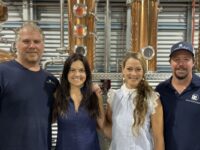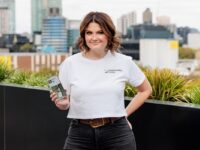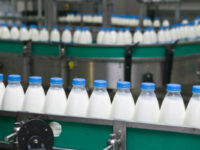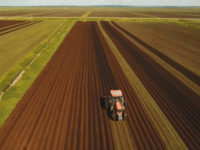The innovative and acclaimed beehive technology HiveIQ is making its debut in the United States as it sets its sights on international expansion.
Third-generation Aussie beekeeper Victor Croker, who developed HiveIQ, is currently on a six-month USA Tour to showcase the HiveIQ beehive and meet with hundreds of large-scale commercial beekeepers and dealers and attend more than 10 beekeeping conferences and gatherings across the country.
Croker said that his projected sales targets already quadrupled in less than five months, so the USA Tour has been extended until December.
“In Georgia, our new dealer sold a trailer load of our product in under 36 hours! The dealer told me it was unheard of to sell that much product at a state beekeeping conference,” Croker shared. “The overwhelmingly positive response from the American beekeeping community to our insulated hives and products has been humbling.
“One of the highlights of our trip has been doing Research and Development on the run – to cater for the different transport systems used in the USA,” he added. “We chatted between road trips and came up with a palletised system tailored to the USA way of hive transport and will be implemented as part of the trials. They’re impressed by our ingenuity and client-focused approach.”
Having won Australia’s highest honour for design and innovation, the 2023 Australian Good Design Award, HiveIQ’s insulated beehive is capable of producing up to 35 per cent more honey, which is modernising the 170-year beekeeping industry. Croker said the thermal properties of the uniquely designed, polystyrene, insulated hives are what makes them so incredibly efficient.
“Old-style thin-walled wooden bee boxes don’t provide a lot of protection from the weather elements, but HiveIQ bee hives authentically replicate the design of tree hollows – the natural, thermal environment for bees. Because our hives are insulated, they work equally well to protect the honeybees from extremely cold or hot weather. Happier bees produce more honey – it’s that simple,” Croker said.
Croker noted that numerous large commercial operations in the US with up to 120,000 beehives lose 30 to 40 per cent of their colonies over winter and have to make the colonies back up for the next season, so they’re constantly splitting their hives to try and recover from all the losses. Some even tried cumbersomely wrapping the hives with insulation materials which is both costly and labour-intensive.
He added that many commercial operations are forced to move their hives down to California to get out of the cold, so they’ve got a better chance of survival. But he contends that both extremes in weather can cause massive bee losses.
“Just trying to help the beekeepers to understand the importance of insulation in those hot extremes, as well as the cold, has been one of our core objectives during the road trip,” Croker said.
HiveIQ is currently supplying a number of commercial operations in the US to field test the insulated hives alongside their wooden hive in the upcoming Winter during almond pollination season.















